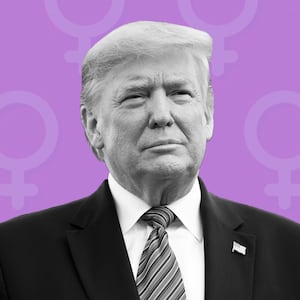Earlier this week, President Donald Trump tweeted what many saw as a racist dog whistle: “Suburban housewives,” he wrote, were thrilled that he had ended a program allowing low-income housing to “invade their neighborhood.” Joe Biden, he added, would reinstall it in a “bigger form,” with Democratic Sen. Cory Booker—a Black man—in charge.
“The ‘suburban housewife’ will be voting for me,” the president declared confidently.
Within days, however, thousands of those same suburban women were organizing against him in the best way they knew how: on Facebook.
If you search “suburban housewives” on Facebook—between the pages dedicated to gossiping about the Real Housewives reality shows and one called “A group where we pretend to be suburban PTA housewives”—you will now find at least eight groups dedicated to overthrowing Trump. The group descriptions and membership varies, but the message is the same: Trump cannot count on suburban women to pull him over the line this November.
“Donald Trump used sexist language to describe us as ‘suburban housewives,’” one group description reads. “He also said that we’d be voting for him. He’s wrong.”
“A group of ‘suburban housewives’ whose vote Trump does NOT have—despite what he seems to think,” reads another.
Loni Yeary Gentry, a stay-at-home mother of three from Florence, Kentucky, started the group “Suburban Housewives Against Trump” on Wednesday afternoon. The objective, she said, was to create a space for other Trump critics in her conservative community to speak freely. When she went to bed that night, the group had just over 100 members. When she woke the next day, it had more than 300. At the time of publication, it had 6,000.
To Yeary Gentry’s surprise, the group members included several mothers from her children's Catholic private school—women she had assumed were Trump supporters.
"I think people may make assumptions,” she said. “And I think that's something the president has done, unfortunately, is make assumptions that all white women are going to support him. And we're not."
Indeed, a recent NPR/PBS poll found that 66 percent of suburban women said they disapproved of the job Trump is doing overall, and 58 percent said they "strongly" disapproved. According to The New York Times’ Nate Cohn, Trump trails Biden by 25 percentage points with female voters. And in the 2018 midterms, when a historic wave of Democratic women swept into office, 51 percent of married men voted Republican, while just 44 percent of their wives did the same.
Presidential candidates have long considered the suburbs, which now make up about half the electorate, key to winning their elections. Trump took the suburban vote by 5 percentage points in 2016, and voters there drove him over the finish line in battleground states like Michigan and Wisconsin. That’s likely why his campaign dispatched more than a dozen female surrogates to the suburbs starting last summer, and why he has been increasingly courting them with his “law and order “message.
But Mary Hayes, the founder of a Facebook group called “The Real Suburban Housewives for Biden/Harris,” pointed out a flaw in Trump’s logic: The suburbs are not dominated by the white women who so famously supported him in 2016. By trying to appeal to suburban housewives with racist comments, Hayes said, Trump is alienating a large part of the increasingly diverse group.
Trump even acknowledged the growing diversity of the suburbs in a recent press conference, noting that more than 30 percent of suburban residents are minorities. But he also doubled down on his tweet, claiming that allowing low-income housing in the suburbs would create “lots of problems” and would “destroy suburbia.” (The policy in question, the Obama-era Affirmatively Furthering Fair Housing rule, was created to prevent housing discrimination. Biden has pledged to reenact it, but said nothing about Booker being in charge.)
“He might as well have said, ‘The white housewife will be voting for me because I kept the low income [people], or the minorities, or however you want to say it, out of your neighborhoods,’” said Hayes, a Black woman and mother of three from Northern Virginia. “You cannot want to get the vote of somebody and discard certain people in that same community.”
Even white mothers living in the suburbs bristled at the term “suburban housewife,” which conjures up images of patriarchal, Leave It To Beaver-style domesticity.
“I guess I’m a suburban housewife, but I definitely don’t feel that way,” said Jaime Spataro, a mother from the Philadelphia suburbs whose “Suburban Housewives for Biden/Harris” group now has 2,400 members.
“When I hear the term ‘suburban housewife,’ I think of a woman in a dress with an apron in the 1950s, vacuuming with a cocktail ready for her husband when he comes home after work at 5:30,” she said. “That’s so antiquated and out of date.”
Suburban moms are no strangers to Democratic organizing on Facebook. The “Pantsuit Nation” group mobilized nearly 3 million women and men in support of Hillary Clinton in 2016. Already, these latest groups have taken on some of the tropes of social media organizing, reclaiming Trumpian insults like “nasty woman” and plastering them across their pages.
But the creators say they hope to make their groups more of a space for conversion rather than a liberal echo chamber. And they are already seeing signs of hope: Hayes said one of her friends who voted for Trump is not voting for him this year, and several more are still on the fence. Gentry said her mother, who has not voted for a Democrat since Jimmy Carter, will not be voting for Trump this time around.
“She didn’t like him then, but she despises him now,” Yeary Gentry said. “And she will vote for Biden this time.”









